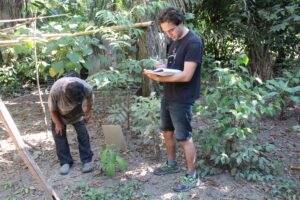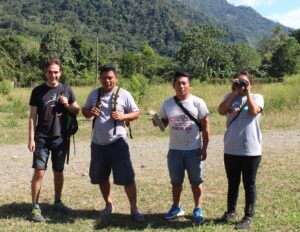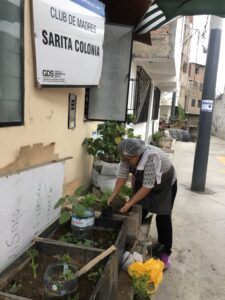In July, Coline Raillon, who worked as the Nature Projects Officer for A Rocha France, will be commencing a long journey on foot across three European countries: Germany, Switzerland, and France. Coline will walk to meet people and create connections. She will also take this opportunity to raise funds for community-based projects in A Rocha, including A Rocha Peru. “The idea is to meet people, talk about A Rocha’s work… the beauty of Creation, and ..share the gospel.” Her journey will start from Heidelberg in Germany and follow parts of the Huguenot Way. The Huguenot Way is a hiking trail that highlights the historical exile of the Huguenots (a religious group of French Protestants from the 17th century). She will also stop at various places including Belfort France, for a scout camp. We wish Coline all the best for her exciting journey, and we will continue to follow her fundraising walk on our social media and websites. To support Coline’s walk, you can donate here. Please click ‘dedicate this donation’ and type in ‘Coline‘ to dedicate your gift. Thank you for your support of A Rocha Peru!
A Volunteering Adventure with A Rocha Peru

In January, A Rocha Peru was excited to receive a new volunteer, Chris Rampersad, a Biologist from the United Kingdom. Chris stayed for three months working on several project activities for the La Libertad Dry Forest Project. He talked with locals about the effects of climate change on the dry forest and also helped the team monitor research plots installed in ACP-Cañoncillo to assess the biomass and necromass of the dry forest. One of his findings was an increase in the height of the trees, with an average growth rate of 2.56m since 2018.
In addition, Chris started his research in Tronco Prieto and ACP-Cañoncillo forests collecting data such as species richness, the abundance of each species, and the amount of felled and dry trees. Chris completed his investigation of pre-existing species in the area, conducting two interviews at the Raimondi Museum and the Trujillo Herbarium.
Afterward, Chris journeyed to our Amazon Natural and Cultural Heritage Pilot Project in Monte Carmelo in the Urubamba River basin. Chris has been helping the team take pictures and support the research into the community’s medicinal knowledge of plants, endangered birds, amongst other things.
A New Pilot Project in the Peruvian Amazon

The Amazon Natural and Cultural Heritage Pilot Project began in June this year. The pilot project works in a small community called Monte Carmelo, located in the basin of the Urubamba River in the Southeastern Peruvian Amazon. A Rocha Peru partners with the Comunidad Nativa Machiguenga Monte Carmelo (Monte Carmelo Machiguenga Indigenous Community) to help conserve and restore ecosystems and endangered species and preserve the cultural traditions and ancestral knowledge in native communities. The project is currently researching birds and medicinal plant species in this area.
To preserve traditions, workshops and talks will be conducted by elders to spread knowledge to the younger generation on the uses of traditional medicinal plants, the Machiguenga language, and other ancestral customs like hunting with bow and arrow.
For the local school, the project is establishing a recreational forest park to create an opportunity to teach children and others about the environment and the importance of preserving natural ecosystems. Stay tuned for more developments in the coming months!
The Women of Sarita Colonia

The Iglesia Verde (Green Church) project moved to Lima at the beginning of this year and has been working for the last six months in the outskirts of the Lima district with some beneficiaries from the Club de Madres Sarita Colonia (Sarita Colonia Mothers’ Club). Through engaging workshops, seminars, and educational campaigns led by Grecia Valdivia, our project officer, the project has shared valuable insights on the biblical mandate for environmental stewardship. The Club de Madres Sarita Colonia, located in the Sarita Colonia neighbourhood in downtown Lima, is home to eight marvelous women. The women were initially skeptical about the project but soon became very warm and receptive. The project has encouraged active involvement with the women showing outstanding effort and commitment.
In collaboration with A Rocha Peru, the women of Sarita Colonia have founded a community kitchen, which provides lunch meals at social prices. In addition, they established an organic garden, planting seeds and growing vegetables that they use to prepare meals in their kitchen. Meanwhile, they have learned techniques such as composting, water conservation, and gardening, which the women can apply in their households. This newfound knowledge empowers them to be eco-conscious decision-makers and role models within their families and the broader community. By utilizing their influence to promote sustainability practices, we have had a larger reach than expected. Unfortunately, the environmental education activities with Club de Madres Sarita Colonia have concluded. The Iglesia Verde Project will continue to spread awareness of the importance of conservation and the preservation of God’s Creation within other communities.
Educating Schools about the Dry Forest
This year, La Libertad Dry Forest Project aims to focus its environmental education on the youth of the Pacasmayo community to help generate environmental leaders and empower them to conserve the dry forest. Many activities have kicked off, including talks about the importance of the dry forest at the National University of Trujillo, Guadalupe, the Tecapa Secondary School, and San Demetrio. The team has created an environmental club called Semillas Teresianas (Teresian Seeds) with the 2nd and 3rd-grade secondary students at the Santa Teresa Inmaculada school in San Pedro de Lloc. The eco-club members visited the Venturosa dry forest and collected photos and information to help develop the eco-club’s vision.Moreover, the team conducted talks to raise awareness about the importance of the dry forest at Santa Teresa Inmaculada, where 300 students participated. To contribute to the conservation of the dry forests, the Santa Teresa Inmaculada School will help plant 100 Algarrobo tree seedlings. The ideal area for planting was identified in Cañoncillo with the help of Cooperativa Agraria de Usuarios de Tecapa.